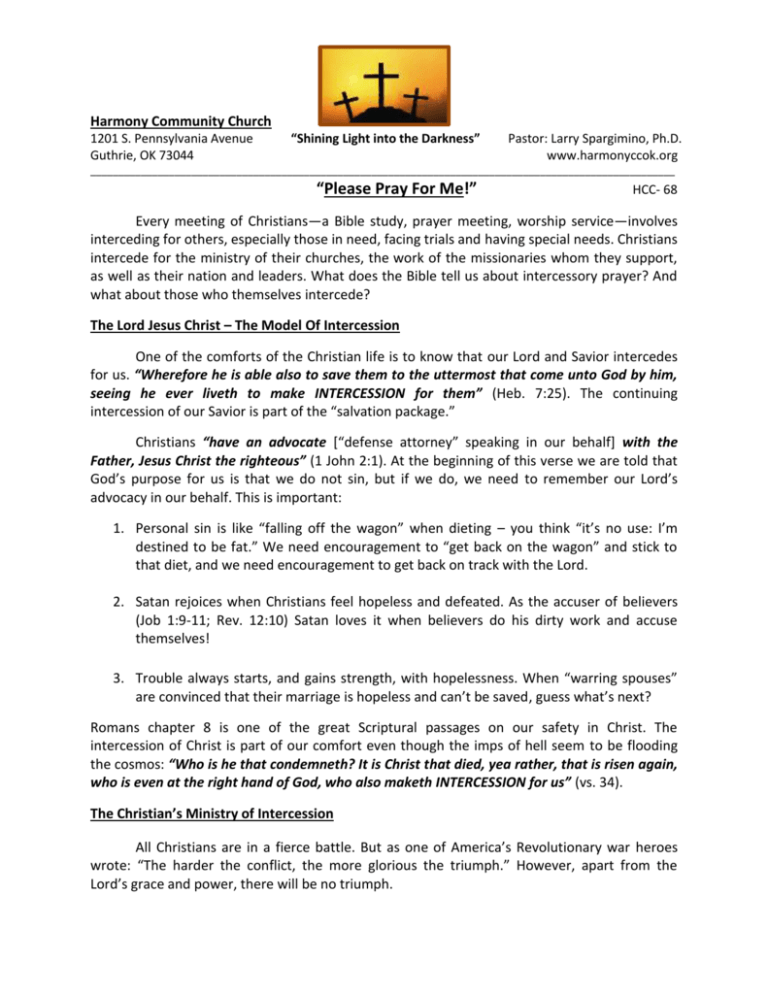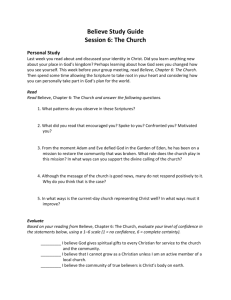
Harmony Community Church
1201 S. Pennsylvania Avenue
Guthrie, OK 73044
“Shining Light into the Darkness”
Pastor: Larry Spargimino, Ph.D.
www.harmonyccok.org
________________________________________________________________________________________________________
“Please Pray For Me!”
HCC- 68
Every meeting of Christians—a Bible study, prayer meeting, worship service—involves
interceding for others, especially those in need, facing trials and having special needs. Christians
intercede for the ministry of their churches, the work of the missionaries whom they support,
as well as their nation and leaders. What does the Bible tell us about intercessory prayer? And
what about those who themselves intercede?
The Lord Jesus Christ – The Model Of Intercession
One of the comforts of the Christian life is to know that our Lord and Savior intercedes
for us. “Wherefore he is able also to save them to the uttermost that come unto God by him,
seeing he ever liveth to make INTERCESSION for them” (Heb. 7:25). The continuing
intercession of our Savior is part of the “salvation package.”
Christians “have an advocate [“defense attorney” speaking in our behalf] with the
Father, Jesus Christ the righteous” (1 John 2:1). At the beginning of this verse we are told that
God’s purpose for us is that we do not sin, but if we do, we need to remember our Lord’s
advocacy in our behalf. This is important:
1. Personal sin is like “falling off the wagon” when dieting – you think “it’s no use: I’m
destined to be fat.” We need encouragement to “get back on the wagon” and stick to
that diet, and we need encouragement to get back on track with the Lord.
2. Satan rejoices when Christians feel hopeless and defeated. As the accuser of believers
(Job 1:9-11; Rev. 12:10) Satan loves it when believers do his dirty work and accuse
themselves!
3. Trouble always starts, and gains strength, with hopelessness. When “warring spouses”
are convinced that their marriage is hopeless and can’t be saved, guess what’s next?
Romans chapter 8 is one of the great Scriptural passages on our safety in Christ. The
intercession of Christ is part of our comfort even though the imps of hell seem to be flooding
the cosmos: “Who is he that condemneth? It is Christ that died, yea rather, that is risen again,
who is even at the right hand of God, who also maketh INTERCESSION for us” (vs. 34).
The Christian’s Ministry of Intercession
All Christians are in a fierce battle. But as one of America’s Revolutionary war heroes
wrote: “The harder the conflict, the more glorious the triumph.” However, apart from the
Lord’s grace and power, there will be no triumph.
2
In a context of spiritual warfare—“For we wrestle not against flesh and blood, but
against principalities, against powers, against the rulers of the darkness of this world, against
spiritual wickedness in high places” (Eph. 6:12), the apostle requests that believers would
intercede for him: “Praying always with all prayer and supplication in the Spirit…AND FOR
ME, that utterance may be given unto me, that I may open my mouth boldly, to make known
the mystery of the gospel” (vss. 18-19). Colossians 4:2-3 is similar: “Continue in prayer, and
watch in the same with thanksgiving; Withal praying also for us, that God would open unto
us a door of utterance, to speak the mystery of Christ, for which also I am in bonds.” Paul’s
request for intercessory prayer is specific: “That I may make it manifest, as I ought to speak.”
For what did Paul ask?
That he would say the right things. There are many ways to present the Gospel, many
ways of establishing contact with hearers--our choice of Scripture, the illustrations we
use, the aspects of our own testimony, how we handle questions and interruptions—all
need to be tailored to the background of the hearers. We are ultimately dependent on
the Holy Spirit’s leadership in this. He has to reveal to us things that we might not
necessarily know.
That he would speak boldly, with assurance and convicting power. As the herald of
Christ, Paul needs to “sound the trumpet” not whine like a hungry dog.
That he would be able to explain “the mystery of the Gospel.” “Mystery” here means
“something not previously disclosed to a group of recipients.” The Apostle has to be
able to: (1) understand the “mystery”; and, (2) communicate it plainly. Some call this
KISS preaching – “Keep It Simple because we are Simple.”
When we intercede for someone doing the Lord’s work we are actually entering into,
and joining, that person’s struggle to make Christ known. “Dear brothers and sisters, I URGE
you in the name of our Lord Jesus Christ TO JOIN IN MY STRUGGLE by praying to God for me”
(Rom. 15:30, NLT). True intercession is more than “saying a prayer for someone.” It is a
stepping into that person’s shoes, so to speak, and struggling together with that person.
By His Authority, In His Place
Because the intercessory work of our Lord establishes the pattern of intercession, our
identity in Christ is central in our ministry of intercession. It is not Sister Mary Lou who is
making intercession for Sister Betty Jane, but rather Sister-Mary-Lou-Who-Is-In-Christ who is
making intercession. By virtue of our union with Christ we have the “keys.”
Copyright © 2/9/2016, by Dr. Larry Spargimino. All rights reserved
3
Jesus said to Peter: “And I will give unto thee the keys of the kingdom of heaven: and
whatsoever thou shalt bind on earth shall be bound in heaven; and whatsoever thou shalt
loose on earth shall be loosed in heaven” (Matt. 16:19). Historically, it has been the practice of
some to believe that this establishes Peter’s headship over the church. However, the same
promise of authority is given by Jesus to all his disciples: “At the same time came the DISCIPLES
of Jesus…Verily I say unto you, whatsoever ye shall bind on earth shall be bound in heaven:
and whatsoever ye shall loose on earth shall be loosed in heaven” (Matt. 18:1, 18).
Peter did use the “keys” to open heaven to Cornelius and Gentiles (Acts 10), but so did
other believers, WHO WERE NOT APOSTLES, proclaim the Gospel and “open heaven” (Acts 8:14). In this latter passage we are told that the Apostles remained in Jerusalem, but the believers
who were scattered after the martyrdom of Stephen went everywhere and preached the Word.
An important verse is 1 John 4:4: Ye are of God, little children,
and have overcome them because GREATER IS HE THAT IS IN YOU, than he that is in the
world.” Who is “them”? The previous verses tell us: those who have the spirit of the Antichrist.
Antichristos= “against Christ” or “in the place of Christ.” According to Romans 15:14 believers
are “full of goodness, filled with all knowledge” and are “competent to counsel one another.”
One Christian asked another Christian: “How are you doing?” The response was, “Pretty well,
under the circumstances.” And the Christian who asked the question said: “What are you doing
under the circumstances?” Good question. The Bible tells us that Christians are: new creations
(2 Cor. 5:17); the temple of God and the dwelling place of the Holy Spirit (1 Cor. 3:16; 6:19);
able to do all things through Christ (Phil. 4:19); seated in the heavenlies (Eph. 1:3-6); complete
in Christ (Col. 2:9-10)…
Moses: The Advocate/Intercessor for Israel
In Exodus 32 we read of Israel’s sin. Under Aaron’s leadership the people took their gold
rings from their ears and brought them to Aaron, who melted it all down and made the Golden
Calf—an Egyptian symbol of power and strength. The people responded with great enthusiasm.
In modern language: “Hey, this is cool! Now we have something we can worship!”
God threatened to destroy the whole nation and promised that he would make Moses
the leader of another great nation (vs. 10). Moses, however, refused that “honor.” Moses didn’t
want that because he knew that God’s name would be dishonored. “Lord, the people will think
that you took these people out into the desert simply to destroy them, and they will say: ‘What
kind of a god is this?’” [paraphrased]. Moses challenged God to remember his promise to
Abraham, Isaac and Jacob, and how God bound himself to them with an oath, that he would
give them a land, and that they would possess it forever.
Copyright © 2/9/2016, by Dr. Larry Spargimino. All rights reserved
4
Those for Whom We Should Intercede
Scripture says that we are to pray for: all who are in authority (1 Tim. 2:2); Jerusalem
(Ps. 122:6); friends (Job 42:8); the sick (James 5:14); enemies (Jer. 29:7; Matt. 5:43-44); those
who forsake us (2 Tim. 4:16); all men (1 Tim. 2:1).
We are to take the call to intercede seriously. Samuel said, Moreover, as for me, God
forbid that I should sin against the Lord in ceasing to pray for you” (1 Sam. 12:23). Intercession
is NOT just for a special group identified as “Intercessors.” “Peter was therefore kept in prison
but prayer was made without ceasing OF THE CHURCH unto God for him” (1 Cor. 12:5).
Be Deliberate, Committed and Purposeful In your Intercession
1. Have a set time to pray – If you wait until you have time, you never will have time. It’s
imperative that we schedule a prayer time, and have a prayer place.
2. Know the character of God (attributes). It’s imperative that we know the God of
Scripture, and not just someone’s idea of who He is and what He is like.
3. Know something of the plight of those in crisis—
Questioning – “Why is this happening to me?”
Guilt – “It’s all my fault. If only I didn’t let him have the car keys that night.”
Fatigue- “I’ve been dealing with this so long I can’t take it any longer.”
Fear- “I am not afraid of death, but I am afraid of the process.” Or, “How will I ever
manage when I am alone.”
Anger- “God is not fair.” “Why aren’t my friends helping me?”
Isolation and rejection – People who have received a troubling diagnosis have to wade
through an avalanche of medical and spiritual advice from friends and acquaintances. People in
crisis are often afraid that those who have given this myriad of advice won’t be happy with
them because they are not eating, or drinking…..
Copyright © 2/9/2016, by Dr. Larry Spargimino. All rights reserved










